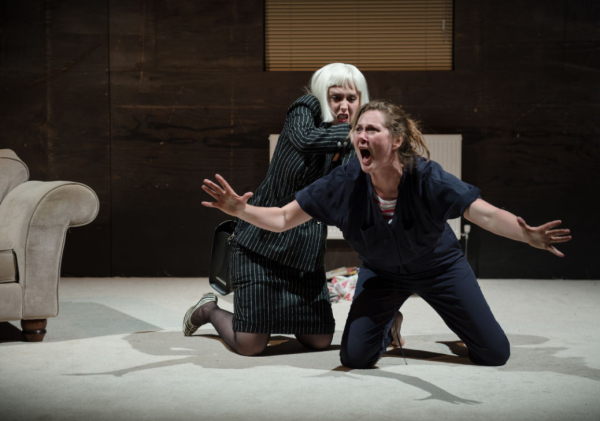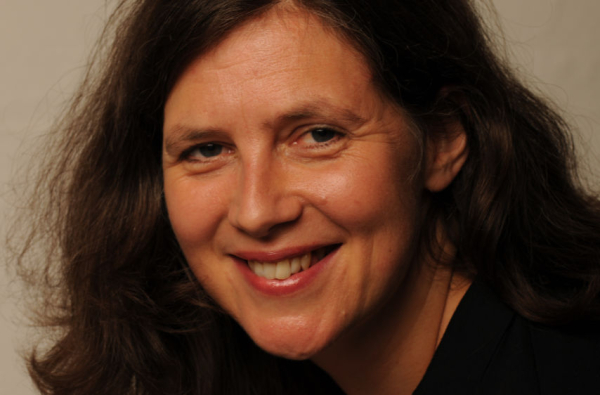Catherine Love: There's a small revolution brewing in Stratford-upon-Avon

© Topher McGrillis
Staged in a temporary space housed within the Courtyard Theatre – itself a temporary structure built on the site of the original Other Place – at the heart of Midsummer Mischief is a quartet of four short plays by women. Each responds in different ways to the provocation, courtesy of Laurel Thatcher Ulrich, that "well-behaved women seldom make history", prodding from different angles at contemporary gender politics. Running alongside this, a series of conversations ask their own questions about feminism, theatre and what it might mean to be radical in the 21st century.
Taking advantage of the freedom offered by the festival to grapple with big ideas, Timberlake Wertenbaker‘s The Ant and the Cicada tries to deal at once with democracy, capitalism, art and family – oh, and the small matter of the current political and economic state of Europe. Her 21st century Greek tragedy revolves around two sisters: one an artist, the other a pragmatist. While the former makes performance art about Greek revolutionary heroines and mourns the decline of democracy, the latter is bringing in a mysterious and not entirely altruistic investor to rescue the family property.
“It’s work that feels urgent, exploratory and even, in certain moments, charged with radical zeal”
“It’s work that feels urgent, exploratory and even, in certain moments, charged with radical zeal”
It feels as though there are several different plays struggling to get out of this ambitious but overburdened hour or so of drama. Just as artist Zoe talks of rehearsing democracy, Wertenbaker’s play seems to be simply rehearsing its arguments about economics and belief, while the insertion of arts funding debates is clumsily handled. It all heats up with an audacious turn in the final third, but the ideas – brilliantly wide-ranging as they are – could do with some dramaturgical wrangling.
Where Wertenbaker thinks big, E.V. Crowe explores her ideas on a much more intimate scale. Her supernatural family drama puts an intriguing spin on the domestic situation that we are so used to seeing dumped on stage, jamming the kitchen sink with an unlikely clairvoyant. In I Can Hear You, two recent family deaths prompt a consideration of what one woman has left behind and what – if anything – another has ahead of her. And when a pop-up crystal shop owner suddenly offers a link to the deceased, the unsaid rises closer to the surface than ever.
The gender politics are partially submerged here, surfacing through the closely observed family dynamics. As it stands, the piece could do with more space for development; its ending arrives with jolting abruptness, seeming to cut Crowe’s ideas short. Flaws aside, Jo McInnes‘ direction hints with impressive economy at the stasis and frustration of the family home, its living room in a seemingly permanent funereal state, while Ruth Gemmell is quietly heartbreaking as the 40-something daughter whose life is restricted to an ever-narrowing track.
Abi Zakarian‘s This is Not an Exit is in some ways the most embryonic of the four plays, which were all written at speed, but its rawness has a power of its own. We see the whole piece through the subjective lens of Zakarian’s protagonist Nora (the chameleonic Gemmell once again), a woman looking ahead at her 40s and fumbling for a foothold in the world. Surrounding her is the detritus of a modern womanhood that she has been complicit in creating in her editorial job on a woman’s magazine. Coverlines scream out about slimming jeans and inner lionesses, while tweets boast of diets and dick pics.
There’s a frantic intensity to this patchwork playlet, which excruciatingly turns up the volume on the everyday anxieties amplified by modern media. Its structure also hints at the fragmentation of the self that this pressure can cause, as Nora struggles to hold on to all the pieces of her conflicted existence. Despite the play’s slightness, in its exploration of two different generations of feminism through Nora and her mother – a strand that I would have been interested to see more of – and its chorus of judging, taunting voices, it creates a vivid snapshot image of the tensions involved in being a woman in a world where we can apparently have it all.
But it’s Alice Birch‘s astonishing Revolt. She said. Revolt again. that really tears, tornado like, through these issues. An extraordinary play by any standards, Birch’s searing feminist critique responds to the initial provocation at the level of both form and content, refusing to behave according to expectations. It is, as the title suggests, something of a call to arms, recognising the failure of previous feminisms and posing various new forms of revolution – all angry, all flawed.
One of the play’s central suggestions is that we need to revolutionise the language in which we discuss gender, something that the piece begins to do through its own brilliantly mischievous experimentation. In one funny but important scene, the vocabulary of seduction is smartly inverted, while elsewhere the logic of rape investigations is sharply interrogated and something as blithely accepted as the way society talks about women in everyday conversation ("adverb adjective noun") as opposed to how it discusses men is laid bare.
It’s all given a visceral and occasionally violent staging by Whyman, exploding furiously across the sparsely dressed stage. As the play becomes less and less well-behaved, its multiple targets overlapping and interrupting one another to the point of complete, overwhelming bewilderment, everything sad and angry and awful about the unequal state of the world seems to come crashing down at once in a cacophonous theatrical scream. And yet, somewhere in all the rage, there remains a radical scrap of hope. Revolt again.
Midsummer Mischief continues at The Other Place at The Courtyard Theatre until 12 July











